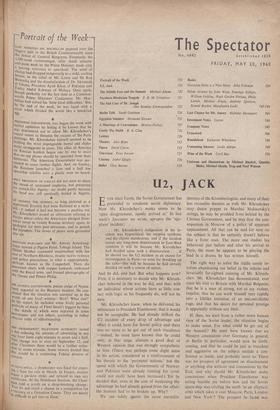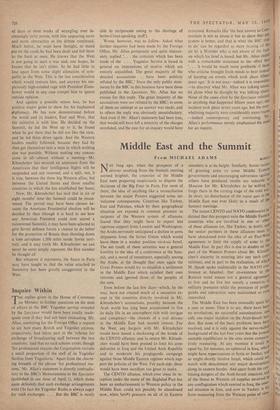U2, JACK
EVER since Lenin, the Soviet Government has pretended to condemn secret diplomacy. Now Mr. Khrushchev's motto seems to be 'open disagreement, openly arrived at.' In last week's Spectator we wrote, apropos the `spy- plane' incident : . . . Mr. Khrushchev's indignation at the in- cident was hypocritical, his surprise synthetic and his claims mendacious, and if the incident causes any long-term deterioration in East-West relations it will be because Mr. Khrushchev had decided upon such a deterioration . . . if he should use the U2 incident as an excuse for intransigence in Paris—or even for breaking up the talks—this will be because he had already decided on such a course of action.
And he did, and had. But what happens now? First, it is necessary to decide why Mr. Khrush- chev behaved in the way he did, and that, with an individual whose actions have as little con- tact with logic as his frequently do, will not be easy.
Mr. Khrushchev knew, when he delivered his ultimatum to President Eisenhower, that it would not be acceptable. He had already milked the U2 incident of every drop of advantage and effect it could have for Soviet policy and there was-no more to be got out of such truculence —indeed, he must have known that he could only, at that stage, alienate a good deal of Western opinion that was strongly sympathetic to him. (There was perhaps some slight sense in his action, considered as a reinforcement of his threats to the 'perimeter nations,' but the speed with which the Governments of Norway and Pakistan were already running for cover could not easily have been increased.) Yet he decided that, even at the cost of weakening the advantage he had already gained from the affair, the Summit had to be broken up. Why?
We can safely ignore the more recondite theories of the Kremlinologists, and many of their less recondite theories as well. Mr. Khrushchev may dance puppet to Marshal Malinovsky's strings, he may be prodded from behind by the Chinese Government, and he may fear the con- sequences in Moscow of a policy of apparent appeasement. All that can be said for sure on the subject is that he certainly doesn't behave like a front man. The more one studies his behaviour just before and after his arrival in Paris, the more he appears to be playing the lead in a drama he has written himself.
The right way to solve the riddle surely in- volves abandoning our belief in the infinite and invariably far-sighted cunning of Mr. Khrush- chev. Mr. Khrushchev has demonstrated, ever since his visit to Britain with Marshal Bulganin, that he is a man of strong, not to say violent, impulse, that he can work himself very rapidly into a lifelike imitation of an uncontrollable rage, and that his desire for personal prestige is apparently without any limit.
If, then, we start from a rather more human view of the Soviet leader, the situation begins to make sense. For what could he get out of the Summit? He must have known that no Western concessions over Germany in general, or Berlin in particular, would now be forth- coming, and that he could be just as truculent and aggressive on the subject outside a con- ference as inside, and probably more so. There was no prospect of agreement on disarmament or anything else without real concessions by the East, and why should Mr. Khrushchev make concessions when President Eisenhower was eating humble pie before him and the Soviet space-ship was circling the earth 'in an elliptical orbit which takes it over Moscow, Paris, London and New York'? The prospect he faced was of days or even weeks of wrangling over in- creasingly petty points, with him appearing more and more obstructive as the debate continued. Much better, he must have thought, to stand pat on the cards he had been dealt and bid them to the limit at once. He knows that the West is not going to start a war and, one hopes, he knows that he isn't either. So he had little to lose apart from some slight alienation of sym- pathy in the West. This is the last consideration which would restrain him, and anyway his sus- piciously high-minded rage with President Eisen- hower would in any case compel him to ignore outside opinion.
And against a possible minor loss, he has positive major gains to show for his haphazard Diplomacy. He has now demonstrated before the world and its leaders, East and West, that the initiative is with him. He decided on the Summit, he led the West up to it, he found when he got there that he did not like the view, and he led them down again. And the Western leaders meekly followed, because they had by then got themselves into a state in which nothing else was possible. Without making any conces- sions at all—almost without a meeting—Mr. Khrushchev has secured an assurance from the Americans that their intelligence flights will be suspended and not resumed, and a split, not, it is true, between the three big Western allies, but between the United States and those smaller countries in which she has established her bases.
Now, Mr. Khrushchev has said that in six or eight months' time the Summit could be recon- vened. The period may have been chosen be- cause the American Presidential election will be decided by then (though it is hard to see how any American President could now attend a reconvened Summit), it may have been selected to give Soviet defence forces a chance to do better for the protection of Russia than shooting down a Ione aeroplane 1,500 miles inside Soviet terri- tory, and it may (with Mr. Khrushchev we can never be sure) simply represent the first number he thought of.
But whatever it represents, the fiasco in Paris may have taught us that the value attached to Summitry has been greatly exaggerated in the West.







































 Previous page
Previous page